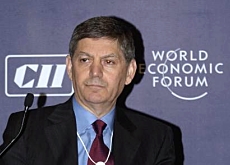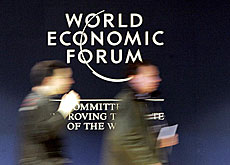WEF puts on its creative-thinking cap

Ahead of the annual World Economic Forum meeting, WEF managing director Ged Davis tells swissinfo there needs to be greater creativity in problem solving.
Davis says all possibilities must be exhausted to successfully meet the challenges of a shifting global landscape.
swissinfo: This year’s theme – “The Creative Imperative” – what does it mean?
Ged Davis: What we are saying is that today we have a situation where institutions don’t fit well with our needs, the capacity of leaders is being questioned and there are issues surrounding their trust. What we need are relevant solutions and what we have tried to do is bring to Davos people who demonstrate that there are new ways of doing things.
Just take the example of China: growing very rapidly, enormous emphasis on the economy, with an environment that needs sustaining and developing – and not always with the resources needed to tackle those problems. There’s also a real need in many countries to reinvent healthcare systems, and we will have people who can bring us up to date with what sort of social innovations are going on there. I think we have to exhaust all possibilities if we want to improve our current situation, and this is partly our contribution.
swissinfo: You mention China. Opinion seems to be divided as to its relative importance in the global economic order and its likely impact on industrialised nations?
G.D.: There are a number of different perspectives and views on China – and India as well. But if you look at the analyses over the past year, China’s capacity to grow quickly and produce products that are very competitive at very low cost is changing the global landscape.
This comes across in the debate on outsourcing and concern about jobs in Europe and the United States. I think it’s fair to say that we have not fully understood the potential impact of China and India on the global economy as a whole, and I think that’s the point we would want to make. What it means is there are many opportunities, but also risks. It is how we manage those that is really one of the core set of discussions that is needed at Davos.
swissinfo: Building trust is one of the themes at this year’s meeting. A recent survey by the WEF showed a distinct lack of faith in business and political leaders. What can be done to rectify this?
G.D.: The evidence is that it takes a good five to ten years to build trust. Trust isn’t built through statements; it’s built through actions. So it’s the concerted actions of business leaders, maybe a new breed of business leaders, that will bring back the level of trust.
I think it’s fair to say that people generally distrust all large institutions. Part of the solution in the large is transparency.
swissinfo: Returning to the theme of “The Creative Imperative”, the WEF recently identified shortcomings in efforts to reach the Millennium Development Goals. Is this an area where you feel more creativity could be applied?
G.D.: I would say yes. Just take Africa: we have just had a year when people have committed money and looked at ways of reducing the debt in some countries. But the final analysis is the benefit to people on the ground, and here there must be a very real opportunity for doing things differently. Looking at the large amounts of money going in, there has to be real concern if all this means is a large growth in the aid community.
Companies, where they can assist, can make a difference in these areas. This is part of what we hope will be discussed in terms of new opportunities and possibilities for really solving problems. Regardless of what one says about business, at the heart of good business is problem solving and I think that’s what I’d like to see showcased at Davos.
swissinfo-interview: Adam Beaumont
Ged Davis joined the WEF in 2004.
Prior to that he had a long career with the Royal Dutch/Shell Group, rising to the position of vice-president Global Business Environment for Shell International.
He was the director of UNAIDS “Aids in Africa” scenario project from 2002-2003.
He is a member of the board of governors of the International Development Research Centre in Ottawa, Canada.
This year’s annual meeting of the World Economic Forum runs from January 25-29 in the Swiss mountain resort of Davos.
Themes include the emergence of China and India, rebuilding trust in institutions and leaders, and innovation in the face of rapid global change.
According to the Geneva-based WEF, the five-day meeting will attract 2,340 participants, including 735 business leaders and 15 heads of state or government.

In compliance with the JTI standards
More: SWI swissinfo.ch certified by the Journalism Trust Initiative

You can find an overview of ongoing debates with our journalists here. Please join us!
If you want to start a conversation about a topic raised in this article or want to report factual errors, email us at english@swissinfo.ch.